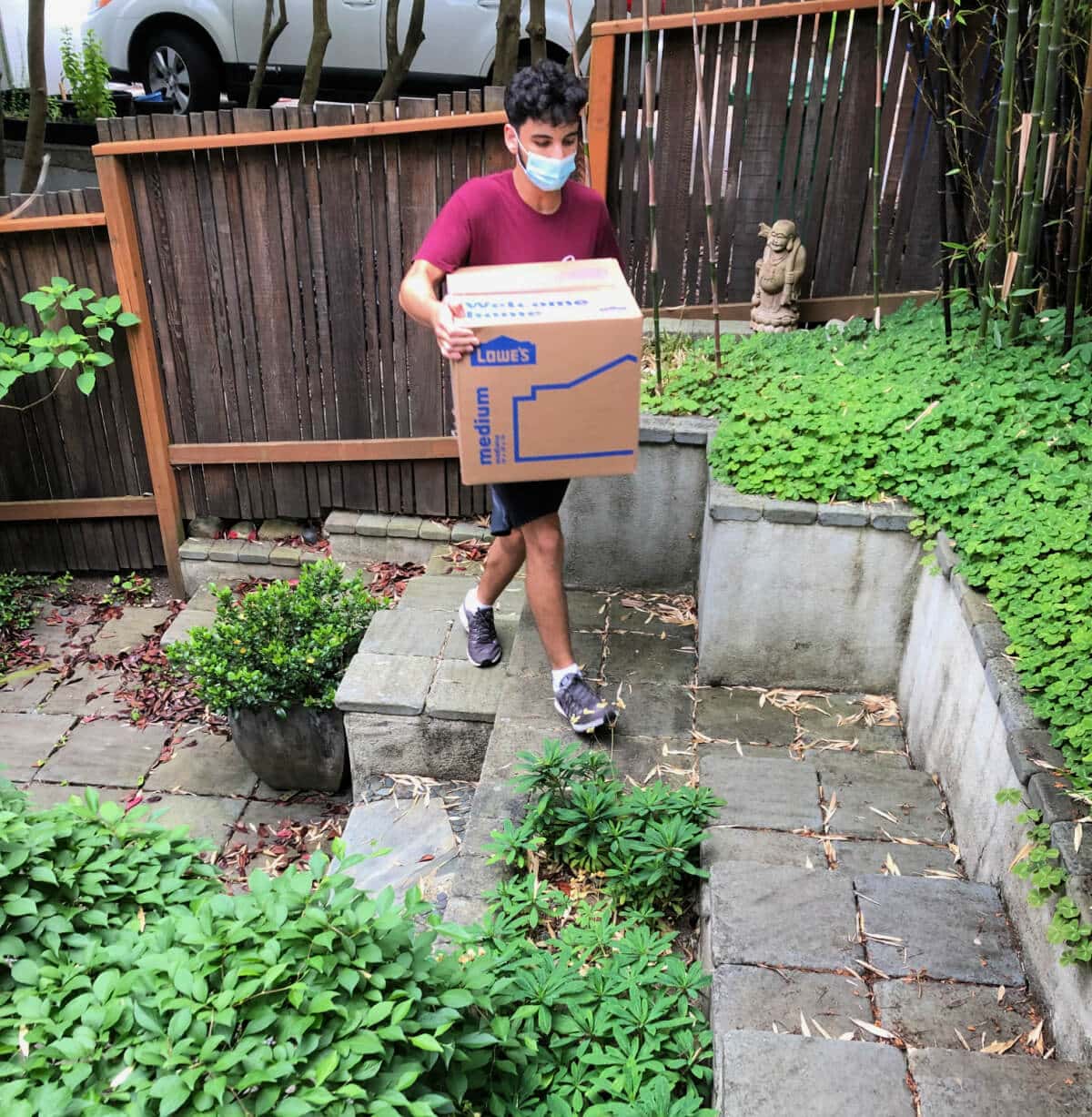
Moving is one of the most stressful experiences a person will undertake. Given the anxiety around it it’s natural that people have numerous questions. You might be wondering ‘how expensive is it to move?’ or ‘how do I find a moving company I can trust?’ Wonder no more! The experts at Gentle Giant have compiled a comprehensive list to answer the most frequently asked moving questions.
No two homes are the same which means that moving costs are not one size fits all. Ultimately, the only way to determine how much your move will cost is to obtain a quote from reputable movers in your area.
However, to break down the cost of hiring movers you must first understand the type of move you plan to make. Is it local or long-distance? Anything beyond 60 to 100 miles from origin to destination is typically considered long-distance. Further, long-distance can be broken down into two separate categories. Intrastate is a long-distance move within the same state while interstate involves crossing state lines. Once you understand the distance of your move, you have to consider additional costs like packing and timing.
Local Movers
Most companies charge an hourly rate for labor on local moves, and often have an hourly minimum. Expect to be charged $25-$60 per worker per hour. However, this may not include a truck and furniture dolly, so be sure to confirm with your move consultant when you receive an estimate. The hourly price is largely determined by the number of belongings and the time it takes to move them. The final cost will also take into account specific details such as distance, dates, packing materials, the amount of stairs and specialty items. These items, like delicate artwork and heavy furniture, require extra care.
Long-Distance Movers
Estimating the cost of a long-distance move is more complicated because pricing is based on complex factors like shipment weight and mileage, along with any additional services. The driver will often weigh a moving truck on a certified scale prior to loading your shipment. Then, once your items have been loaded, the truck will be reweighed. The difference between the two is the net weight, and is a key factor in determining the cost of your move. Other factors include mileage, packing, and insurance. Be prepared to pay a minimum flat rate of $1,000 when hiring movers for your long-distance move.
Additional Charges/Services
1) Packing and Packing Materials
Local movers will typically charge about $60 per hour for this service. For long-distance moves, you will usually be quoted a fixed price based on your move size and the nature of your items.
2) Storage
If you wish to store your items many moving companies will have storage facilities for you to avail of.
3) Extra Fees for Specialty Items
If you have several bulky or heavy items like a sofa, you will be charged extra for this.
4) Extra Fees for Special Circumstances
Movers are often required to charge their customers for various special circumstances that may arise. You may incur a long carry or elevator fee depending on the distance from your entryway to the moving truck, and whether or not movers are forced to go up and down several flights of stairs.
Other considerations that may increase the overall price of your move are insurance and tipping. You will receive basic protection for your household items through the basic limited liability protection which is free of charge. At $0.60 cents per pound you may be in search of extra coverage though. Discuss purchasing further coverage for your valuables with your moving company.
If you are satisfied with how your movers handled your move, you may want to thank them for their efforts by offering them appropriate tips. As a rule of thumb, tipping for local moving starts at around $5 per hour per mover.
Demand for moving services is generally at its lowest during the middle of the month and, in particular, the middle of the week. If your schedule allows for a move on one of these days, many movers offer their most competitive rates.
Fall
The mostly dry and cool climate makes fall an attractive option. However, if you have school-age children the process of moving may be too disruptive.
Winter
Given the decrease in demand, moving in winter is cheaper. You will also be more likely to book your preferred moving date as companies will have more availability. But the often inclement weather requires more preparation than a typical move as customers must ensure entryways are clear and pathways have been salted for move day.
Spring
Like winter, the spring season will also see moving companies experiencing less demand. This means services may be cheaper and more readily available. Those with school-age children may find spring to be a challenging time to move though.
Summer
Home-selling season peaks in summer. This means that it is an ideal time to sell your home. However, the cost of a summer move is much steeper. Approximately 70% of all moves take place between Memorial Day and Labor Day. The increased demand means that moving company rates are at their highest.
Ideally it is best to start scheduling your move as far in advance as possible, especially if you are planning on moving during the summer. The further out you plan your move, the greater the availability you will have in choosing a date convenient for you. A general rule of thumb is to contact your moving company no later than two weeks in advance of your desired move date.
Local Move within the Same City
If you are looking to move during the summer then book as soon as you can. Ideally, two to three months before your move date. If you are not moving during summer, you can book anywhere from two to four weeks out.
City Move within the Same State
For intrastate moves we recommend booking your preferred movers 10 to 12 weeks out, especially if you are in search of a summer date. Off-season intrastate moves typically require four to eight weeks of notice, with two months being the optimal amount of advance notice.
Interstate Move
Interstate moves demand more planning than intrastate so you should begin your search for a reputable mover at least three months out. In general, the further you move, the fewer number of movers there will be to choose from.
Local Moving Estimate
A local moving estimate usually includes some, or all of the following elements:
1) The estimated weight of your belongings.
2) The number of items to be moved.
3) Travel time.
4) Packing materials and labor. This charge will only apply if the moving company is doing some, or all of the packing for you. You can either be charged for an hourly labor rate or a per-box flat rate.
5) Packing boxes and box delivery. Many moving companies will offer pre-used boxes at discounted prices. You can purchase brand new or discounted pre-used packing boxes through Gentle Giant’s Top Box service.
6) Insurance.
7) Short or long-term storage.
8) Specialty services like crating.
Long-Distance Moving Estimate
Your move’s net weight, along with mileage, packing, insurance, and other services, are all used to determine the move cost. It is important to note that there are three types of interstate estimates.
Non-binding: The customer pays for the actual cost of the move regardless if it falls under or over the estimated price.
Binding: The customer pays the exact amount of the estimate.
Not-to-exceed: The customer will not pay more than the estimate but could end up paying less if the actual move weight is less than the estimated weight.
It is highly recommended to only work with trustworthy moving companies that provide binding or not-to-exceed estimations. Gentle Giant Moving Company offers a binding price for your move once they have taken an inventory of all belongings, as well as identified a timeframe for delivery.
Taking the time to research potential moving companies is more than worth it in the long run. Properly vetting the companies can be the difference between a stress-free or stressful move!
1) Get referrals. Talk to friends, family, and coworkers and find out who they recommend. If you are working with a real estate agent then ask them for a referral.
2) Know your options. Don’t settle for the first estimate you receive. Stick to the rule of three and seek estimates from at least three different movers.
3) Verify credentials. For interstate movers, the company must have a number issued by the Department of Transportation. Look for the DOT number on their website to ensure they are licensed. Additionally, you should consider using a company that is certified by the American Moving & Storage Association (AMSA), or visit the Better Business Bureau website to determine what grade has been assigned to the mover.
Are you planning a local or long-distance move? Hire professional movers like Gentle Giant to take away the stress of the move! Check out our moving checklist for further information on how to prepare for your move and use our free move estimate tool to determine the cost of your move. Additionally, you can view our locations, and the various services we offer including packing, piano moving, and more here.

